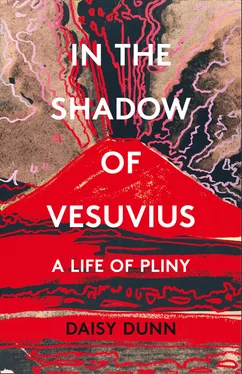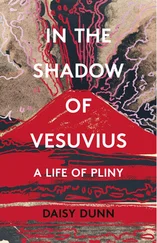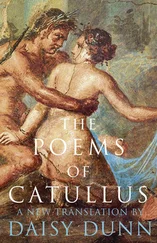While initially Nero put on an honourable front – arranging an elaborate funeral for Claudius, abolishing some taxes and reducing others, hosting extravagant entertainments for the people – he soon lived up to Pliny the Elder’s assessment of him. 35First he had his stepbrother Britannicus poisoned. Then, after several failed attempts, he dispatched his controlling mother to her death. Then he killed his aunt. He then kicked his pregnant wife Poppaea to death when she reproached him for returning home late from the races. 36Around sixty years would pass before Suetonius recounted these murders in his Lives of Rome’s rulers, from Julius Caesar to Domitian. The Algerian-born biographer (he is thought to have come from the Romanised town of Hippo Regius) was head of the libraries at Rome and had access to the imperial archives. Even allowing for some bias in his account, it is clear that the latter part of Nero’s rule was deeply unsettled. If Pliny the Elder had hoped that he would have more freedom to pursue his literary interests after returning from his Germanic expeditions, then Nero’s impulsiveness showed him otherwise.
When a fire broke out in Rome in AD 64, the emperor was among those suspected of starting it. Nero is in fact thought to have been outside the city when the fire started, but this did not stop some historians from speculating as to why he might have been so eager to destroy it. ‘As if offended by the ugliness of the old buildings and by the narrow winding streets,’ wrote Suetonius, ‘he set fire to the city so openly, that several men of consular rank caught his attendants with tow and torches on his own estate but did not arrest them.’ 37The city burned for six days and seven nights. To deflect blame, Nero selected a scapegoat. He became the first Roman emperor to persecute Christians, whom he was said to have punished less for the conflagration than for their ‘hatred of the human race’. 38‘Believers’ were wrapped up in animal pelts and bitten by dogs, fixed to crosses, and used as human torches to light up the night sky over the imperial gardens. Amongst the Christians to die in Nero’s reign were the apostles Peter and Paul.
It was not only the early Christians but the Roman senators who feared for their lives as their role became increasingly redundant in the face of Nero’s autocracy. Political delatio or ‘informing’ became a profitable business in Pliny the Elder’s lifetime and would continue to plague Rome after his nephew entered the senate in the late eighties AD. A man who laid an accusation against another could achieve political advancement as well as money. If he succeeded in informing upon someone for maiestas , or treason, then he was entitled to at least a quarter of the defendant’s property (further funds went to the state treasury). 39An unscrupulous emperor was only too happy to accommodate such activity if it resulted in the downfall of a senator who threatened his power. Stability in Rome had always depended upon its citizens’ willingness to monitor each other. Informers might have stolen the people’s ‘commerce in speaking and listening’, but for some men that was a small price to pay for an emperor’s protection and the opportunity for self-advancement. 40
Such was the climate when, in AD 65, a group of senators, equestrians, and members of the Praetorian Guard came together to hatch a plan to blot out Nero’s poison for good. Intent on killing him during the coming games, the conspirators gathered round a popular senator named Gaius Calpurnius Piso, who might have made an honourable substitute for Nero, if only the details of their plot were not leaked before it could be executed. 41No sooner had Nero learned what awaited him than he made after the conspirators. Among those to die for their alleged involvement in the plot were Nero’s former tutor, Seneca the Younger, Seneca’s poet nephew Lucan, and that ‘arbiter of elegance’ Petronius, a satirical writer who was accused of being friends with one of the conspirators. 42
Pliny the Elder played no part in the conspiracy but grew increasingly cautious about what he wrote down. In the mid to late sixties AD, when ‘every kind of study that was a little freer or more creative was rendered dangerous by the servitude of the times’, as his nephew later put it, Pliny the Elder resorted to writing only what he was certain could not offend: an eight-book treatise on The Ambiguities of Grammar. 43
Pliny the Younger, known here onwards as ‘Pliny’, was born in about AD 62 under Nero, the last of the Julio-Claudian emperors, matured under the Flavian dynasty – Vespasian, his elder son Titus, and younger son Domitian – and peaked under the emperors Nerva and Trajan. We know far more about him than we do his uncle because he wrote so profusely of his experiences. One of the great chroniclers of life, Pliny could be rather pompous and self-regarding, but he was also highly sensitive to the world around him. His surviving letters, which range from a couple of lines to several pages of Latin, provide a rare insight into the habits of his uncle and an unparalleled portrait of his own life at the very centre of things in the first and early second centuries AD.
This was a period in which an equestrian could advance very quickly through the ranks of society. One hundred and fifty years earlier, Cicero had felt marginalised as a ‘new man’ – the first in his family to enter the senate – in a world dominated by aristocrats. Pliny seems to have experienced no such prejudice as he proceeded in his career. He became a senator and went on to document what it was like to live and work under an emperor’s nose. Of the many rulers he lived under, Domitian, who reigned from AD 81 to 96, and Trajan, who reigned from AD 98 to 117, shaped his experience the most. Pliny’s letters post-date Domitian but frequently refer back to the events of his rule. Generally despised by the historians who described him, Domitian caused Pliny considerable unease, but must have supported him for him to have risen through the senate as he did. Pliny’s letters reveal his struggle to distance himself from the detested Domitian in the wake of his death. Trajan, by contrast, was an immensely popular ruler, his rise to power hailed in his own times as the beginning of ‘a very happy age’ in Rome’s history. 44Pliny exchanged over a hundred letters with the ruler and honoured him with an extravagant speech. The Panegyricus , which Pliny delivered in the senate house in AD 100, is highly prized because it is the earliest complete speech to have survived from ancient Rome since Cicero’s Philippics against Mark Antony of 43 BC. 45
Pliny’s letters contain another important first: the earliest pagan sources on the tension between Romans and Christians. 46Pliny encountered what he called the ‘depraved and unbridled superstitio ’ – a subversion of what he understood by ‘religion’ – after Trajan dispatched him to Bithynia, on the south coast of the Black Sea, one of the many provinces now ruled from Rome, in the last years of his life. 47Although Pliny could never have predicted that by the fourth century Christianity would be the central religion of the Roman empire, his understanding of its resilience as a faith must have influenced the way he engaged with the Christians he met.
After his uncle’s death in AD 79, Pliny became his beneficiary and worked hard to sustain his memory. He inherited his agricultural estate in the upper Tiber valley (in modern Perugia), and personal effects including 160 of his notebooks, double-sided and written in ‘the very smallest handwriting’. fn2Pliny the Elder had once rejected an extraordinary offer of 400,000 sesterces for his notebooks in favour of leaving them to his nephew. And, as Pliny later reflected, ‘there were rather fewer’ notebooks at that time than there would be by AD 79. He also bequeathed his nephew his name. 48Pliny the Elder had no children by the time he died and Pliny had lost his father as a boy. Pliny the Elder therefore adopted him posthumously by bequest of his will. It was in recognition of his adoption that Pliny the Younger tended to use the name ‘Plinius’, after his maternal uncle, rather than ‘Caecilius’, after his natural father.
Читать дальше












